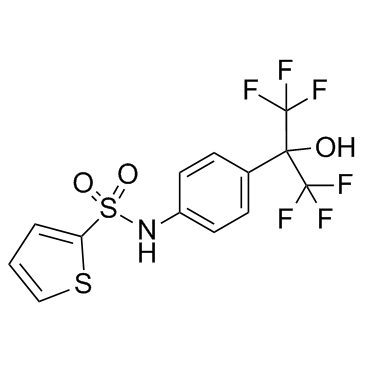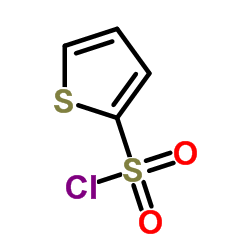SR3335

SR3335 structure
|
Common Name | SR3335 | ||
|---|---|---|---|---|
| CAS Number | 293753-05-6 | Molecular Weight | 405.336 | |
| Density | 1.6±0.1 g/cm3 | Boiling Point | 465.4±55.0 °C at 760 mmHg | |
| Molecular Formula | C13H9F6NO3S2 | Melting Point | N/A | |
| MSDS | N/A | Flash Point | 235.3±31.5 °C | |
Use of SR3335SR3335 is a selective RORα synthetic ligand, directly binds to RORα (Ki 220 nM) but not other RORs, and functions as a selective partial inverse agonist of RORα in cell-based assays. |
| Name | N-[4-(1,1,1,3,3,3-hexafluoro-2-hydroxypropan-2-yl)phenyl]thiophene-2-sulfonamide |
|---|---|
| Synonym | More Synonyms |
| Description | SR3335 is a selective RORα synthetic ligand, directly binds to RORα (Ki 220 nM) but not other RORs, and functions as a selective partial inverse agonist of RORα in cell-based assays. |
|---|---|
| Related Catalog | |
| Target |
Ki: 220 nM (RORα)[1] |
| In Vitro | SR3335 is a selective RORα partial inverse agonist. In a biochemical radioligand binding assay using [3H]25-hydroxycholesterol as a label it is clear that unlabeled SR3335 dose-dependently competes for binding to the RORα LBD. The Ki is calculated as 220 nM using the Cheng-Prusoff equation. In a cell-based chimeric receptor Gal4 DNA-binding domain-NR ligand binding domain cotransfection assay, SR3335 significantly inhibits the constitutive transactivation activity of RORα (IC50=480 nM)(partial inverse agonist activity), but has no effect on the activity of LXRα and RORγ[1]. |
| In Vivo | Pharmacokinetic studies indicate that SR3335 displays reasonable exposure following an i.p. injection into mice. The ability of SR3335 is assessed to suppress gluconeogenesis using a diet induced obesity (DIO) mouse model where the mice where treated with 15 mg/kg b.i.d., i.p. for 6-days followed by a pyruvate tolerance test. SR3335 treated mice displays lower plasma glucose levels following the pyruvate challenge consistent with suppression of gluconeogenesis. Importantly, mice treated with SR3335 displayed no difference in body weight or food intake after 7-days of treatment with SR3335[1]. |
| Cell Assay | HEK293 cells are maintained in Dulbecco’s modified Eagle’s medium (DMEM) supplemented with 10% fetal bovine serum at 37°C under 5% CO2. HepG2 cells are maintained and routinely propagated in minimum essential medium supplemented with 10% fetal bovine serum at 37°C under 5% CO2. 24 h prior to transfection, cells are plated in 96-well plates at a density of 15×103 cells/well. Transfections are performed using LipofectamineTM 2000. 16 h post-transfection, the cells are treated with vehicle or SR3335. 24 h post-treatment, the luciferase activity is measured using the Dual-GloTM luciferase assay system. The values indicated represent the means±S.E. from four independently transfected wells. The experiments are repeated at least three times[1]. |
| Animal Admin | Mice[1] 30 week old Diet induced obese (DIO) C57BL/6 male mice are purchased from Jackson Laboratories that are maintained on a 65% Kcal high-fat diet from weaning. DIO mice are treated twice per day (07:00h and 18:00h) with 15 mg/kg SR3335 or vehicle for 6 days i.p. Pyruvate tolerance test is conducted on day 6 of the treatment. Food is removed from mice in the morning after SR3335 injection, fasted for 6 hours and the pyruvate tolerance test is conducted at 13:00h. Time 0 blood glucose is measured taken from the tail nip and the pyruvate challenge is initiated by injection of 2g/kg of pyruvate i.p. followed by measuring blood glucose at 15, 30 and 60 min following the injection. Blood glucose is measured by one touch ultra glucose-meter. |
| References |
| Density | 1.6±0.1 g/cm3 |
|---|---|
| Boiling Point | 465.4±55.0 °C at 760 mmHg |
| Molecular Formula | C13H9F6NO3S2 |
| Molecular Weight | 405.336 |
| Flash Point | 235.3±31.5 °C |
| Exact Mass | 404.992798 |
| PSA | 103.02000 |
| LogP | 3.74 |
| Vapour Pressure | 0.0±1.2 mmHg at 25°C |
| Index of Refraction | 1.542 |
| InChIKey | LZWUNZRMANFRAO-UHFFFAOYSA-N |
| SMILES | O=S(=O)(Nc1ccc(C(O)(C(F)(F)F)C(F)(F)F)cc1)c1cccs1 |
|
~63% 
SR3335 CAS#:293753-05-6 |
| Literature: GRIFFIN, Patrick R.; ROUSH, William R.; KUMAR, Naresh; NUHANT, Philippe; BURRIS, Thomas; SOLT, Laura Patent: WO2011/115892 A1, 2011 ; Location in patent: Page/Page column 6; 45; 46 ; WO 2011/115892 A1 |
|
~% 
SR3335 CAS#:293753-05-6 |
| Literature: GRIFFIN, Patrick R.; ROUSH, William R.; KUMAR, Naresh; NUHANT, Philippe; BURRIS, Thomas; SOLT, Laura Patent: WO2011/115892 A1, 2011 ; WO 2011/115892 A1 |
| Precursor 2 | |
|---|---|
| DownStream 0 | |
| t0507-1786 |
| ml176 |
| N-[4-(1,1,1,3,3,3-Hexafluoro-2-hydroxy-2-propanyl)phenyl]-2-thiophenesulfonamide |
| 2-Thiophenesulfonamide, N-[4-[2,2,2-trifluoro-1-hydroxy-1-(trifluoromethyl)ethyl]phenyl]- |
| sr3335 |
| cs-1044 |


